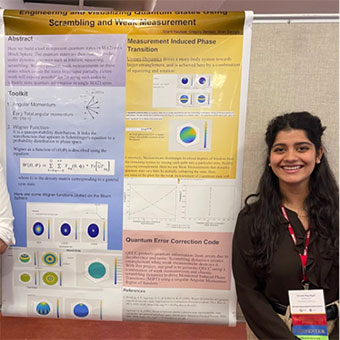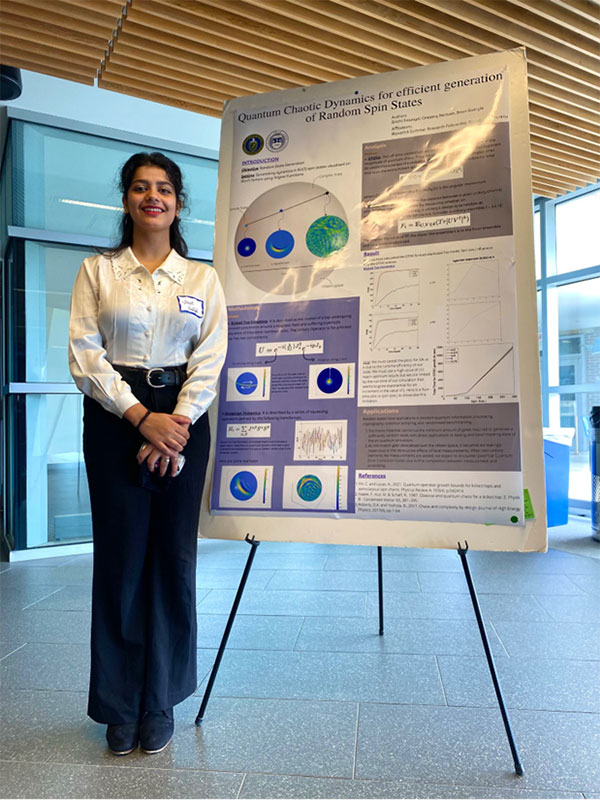Srishti Nautiyal ’23
 Srishti at SACNAS Conference, Brown University, June 2022
Srishti at SACNAS Conference, Brown University, June 2022
- Majors: Physics and Mathematics
- Accomplishments: URCC Peer Research Mentor 2022-23
Spotlight Interview
The responses have been edited for clarity and length.
URCC: How did you find out about opportunities for undergraduates to do research or creative scholarship?
Srishti: While taking quantum mechanics with Professor Brian Swingle in spring 2021, we learned that unlike space, time is not a measurable quantity but a parameter that is described by a function called as time evolution operator. This operator is reversible, i.e., theoretically, we can go back in time. I sent an email to Professor Swingle asking about the applicability of this concept in macroscopic systems like reversing milk and tea. Our discussion led to a potential summer research project idea that in fact, came to fruition.
Additionally, I have subscribed to various listservs for DivSci, URCC and Department of Physics to follow on research and scholarship opportunities.
URCC: What is your creative or research project topic or area? What research or creative questions are you exploring?
Srishti: I currently work on quantum chaotic dynamics. As a many-body quantum system evolves in time, it explores an immense Hilbert space whose volume grows exponentially with the number of particles. I am interested in generating random quantum states that explore this gigantic space as efficiently as possible. My research is guided by two broad questions: how far we can go on the Hilbert Space (randomness) and how fast we can get there (complexity).
URCC: What sparked your interest in your chosen academic research area? Did you engage in any creative or research projects prior to your current project? If so, can you tell us about them?
Srishti: Growing up, I wanted to be Morgan Freeman from "Through the Wormhole" because I thought he was a physicist. I didn't realize he was an actor until high school and I had already decided to be a theoretical physicist by then. At Brandeis, my interest in physics has grown from being a student to being an active researcher. The most influential of my classes was quantum mechanics with Professor Swingle. It was like learning a new language to describe things we didn't know existed or could exist.
URCC: What research skills did you need to get started? How did you get training or acquire those skills
Srishti: I read various textbooks and research papers on angular momentum, measurement and entanglement in Spring 2021 to prepare for my summer research project. In spring, I attended weekly meetings with my PI Gregory Bentsen, a postdoctoral Fellow in the Department of Physics to discuss the lessons and papers. I also met with some graduate students in the Physics department to learn more about their research experience and their advice for starting out my own research journey.
URCC: What type of funding have you received for your project, including grants, fellowships, and paid research assistant positions?
Srishti: I had a paid summer research job that also extended to a part-time assistantship for fall 2021. I was a recipient of the Blavatnik Research Fellowship for summer 2022.
URCC: What are/were some challenges or obstacles you faced during this process and how did you overcome them?
 Srishti at Brandeis SciFest, Aug. 2022
Srishti at Brandeis SciFest, Aug. 2022
Srishti: When I first started academic papers, I would find myself struggling to understand what questions they are trying to answer let alone the answers themselves. This was discouraging and filled me with imposter syndrome and my credibility to do research. I tried to steer myself to rely more on the resources available to me — my supervisor, research group, other professors and peers, etc. Unsurprisingly, the most effective source of encouragement proved to be my mother even when she was oceans away from me in India. She shared with me a quote from Confucius when I shared my worries with her. The quote read, "The man who asks a question is a fool for a minute, the man who does not ask is a fool for life... " I was hesitant to ask questions because I was afraid it reflected my ignorance on the subject area … so persisting through papers, asking more questions and not giving up seemed to be the most rational approach to overcome the challenges of learning. One year hence, I was discussing my senior thesis project with my supervisor and realized that I had in fact made progress as a researcher. Now, I could read multiple papers, make connections and even build on to the questions asked in a conducive manner.
URCC: What advice do you have for students who want to participate in research?
Srishti: Research experience must not be treated as another section to be checked off of your resume checklist. You should engage in research that interests you — things that inspire in you a sense of intrigue and curiosity. This way, the process of research itself holds value and satisfaction regardless of the end results.